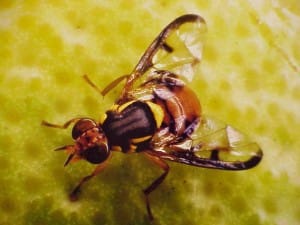Source(s): Jim Howell, Ph.D., Entomologist, The University of Georgia
If you see small flies or gnats in your kitchen, they are probably fruit flies. Fruit flies can be a problem year round, but are especially common during summer and fall when they are more likely to be attracted to ripe or fermenting fruits and vegetables.
 Identification
Identification
Fruit flies are small, red-eyed insects about 1/8 inch long, usually tan in front with a black behind. They’re easily identified by their erratic aerial stagger in the vicinity of ripe fruit.
Biology
Fruit flies are very common in restaurants, markets and other places, including our homes, where food is allowed to decay and ferment. They are often brought into our homes on previously infested produce but may also fly in through poorly screened windows and open doors. Females deposit eggs on fermenting foods, especially fruits and vegetables, and the developing larvae continue to feed near the surface.
The reproductive potential of these insects is incredible. If left undisturbed, a single female can lay 500 eggs, and the offspring can go from egg to adult in about a week. They have a special affinity for the rapidly fermenting fruits and vegetables, including apples, bananas, peaches squash and melons. However, they may breed in drains, garbage disposals, trash containers and empty cans. There is even a report they can reproduce in a wet mop! All they need is a moist film on a fermenting substance.
Damage
Fruit flies may have the ability to contaminate foods with bacteria and other disease producing organisms, and their presence in large numbers can be a major nuisance for the homeowner. The dancing plume of fruit flies that rises up from a bowl of ripening fruit is not a sight you want to see when entertaining guests.
Control
As with many food and pantry-infesting pests, the most important thing is to find the source. Locate all breeding areas and eliminate them. Simply put, throw out the infested fruit or produce. Fail to do so, and the problem will continue and increase, regardless of how many adults that you may kill. After removal of the infested products, remaining fruit flies can be killed with a pyrethrin-based aerosol or other insecticide labeled for indoor use in controlling fruit flies.
Prevention
The best way to prevent fruit flies is not to allow an infestation to develop. Be aware of fermenting fruits and vegetables. Ripe fruit should be eaten, throw away or refrigerated. Damaged pieces should be discarded. A single piece of fruit left in the back of the closet or fruit juice spilled beneath a cabinet or refrigerator, may be the source for thousands of fruit flies. Also, windows and doors should have tight-fitting screens to keep adult fruit flies from entering the home.
Center Publication Number: 246
- Icky Silverfish are Generally Harmless - September 24, 2013
- Menacing Mice - September 24, 2013
- Opossum Damage and Control - September 24, 2013